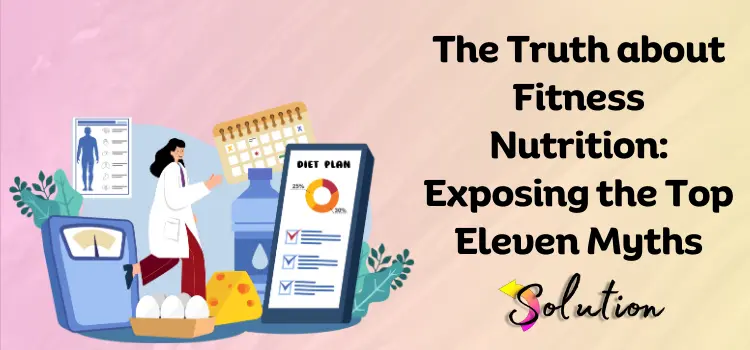
The recent era of influencers, fitness, and nutrition has taken center stage. Everywhere you look—social media feeds, blogs, or even casual conversations—you’ll find a sea of influencers sharing tips about the “best” foods for optimal health and a fit lifestyle. While this widespread awareness is commendable, it has also given rise to a significant problem: misinformation. Some individuals, often unintentionally, spread myths and half-truths about nutrition, leaving multiple individuals confused and unsure of whom or what to trust. The saying “the deeper you get into a pool of information, the more confused you will become” has shown to be true.
Many common views about fitness and nutrition lack empirical support; thus, it is necessary to examine these assertions skeptically. Don’t worry; this guide is here to assist. We’ll distinguish reality from fiction and dispel the most prevalent dietary fallacies that often impede fitness lovers. Understanding the truth allows you to make educated decisions and establish a healthy, sustainable lifestyle while avoiding misleading trends. Let’s refute these falsehoods and put the record right once and for all.
Debunking the Most Common Nutrition Myths in Fitness
The world of fitness and nutrition is full of innumerable suggestions, tactics, and trends, some of which are beneficial, while others are deceptive. It’s easy to believe misconceptions when celebrities or self-proclaimed experts propagate them online. Here are 11 common dietary misconceptions in fitness that have been debunked, along with practical advice to help you make informed fitness decisions.
Myth 1: Carbohydrates Induce Weight Gain
People frequently blame carbohydrates as the primary cause of weight gain. However, weight gain occurs whenever you consume more calories than you burn, regardless of the cause. Carbohydrates are your body’s major source of energy and are required for peak performance, particularly during exercise. Now, focus on ingesting complex carbohydrates such as whole grains, fruits, and vegetables. These give consistent energy and necessary nutrients. To ensure a well-rounded diet, balance your carbohydrate consumption with proteins and fats.
Myth 2: Consuming Fat makes you Fat
The second most widely accepted fact is that dietary fat does not immediately transfer into body fat. Avocados, nuts, seeds, and olive oil include healthy fats, which are essential for hormone synthesis, cognitive function, and overall wellness. The best approach to eating it is to incorporate healthy fats into your diet while keeping portion quantities in check, as oils are high in calories. For maximum health, avoid trans fats and instead consume omega-3 and omega-6 fatty acids.
Myth 3: You Need Protein Shakes Right After a Workout
While protein is crucial for muscle repair, the “anabolic window” (30 minutes post-workout) is not as small as previously thought. Your body benefits from consuming protein throughout the day. You may guarantee that you satisfy your daily protein requirements by eating a variety of healthy foods and, if necessary, taking supplements. Prioritize high-quality proteins such as lean meats, eggs, dairy products, and plant-based alternatives.
Myth 4: Skipping Breakfast Slows Your Metabolism
The second misconception is that skipping breakfast does not naturally lower your metabolism. Meal time and frequency have less influence on metabolism than total calorie intake and expenditure. Try to select a food plan that matches your lifestyle. You can skip breakfast if you’re not hungry in the morning, but ensure that your other meals are well-balanced.
Myth 5: Detox Diets and Juices Cleanse Your Body
Your liver and kidneys are your body’s natural detoxification systems. Most detox diets and juice cleanses are marketing gimmicks with little scientific basis. Stay hydrated, consume fiber-rich meals, and limit your intake of processed foods to help your body’s natural detox process. Trust your body to perform the tasks it was built to do.
Myth 6: You Can Spot Reduce Fat
Targeting particular regions for fat reduction, such as practicing crunches to lose abdominal fat, is not feasible. Fat loss occurs throughout the body and is dependent on total calorie deficit. To enhance general fat reduction, combine strength training, aerobic activity, and a well-balanced diet. Patience and constancy are crucial.
Myth 7: High Protein Diets Damage Your Kidneys
High-protein diets have no negative impact on renal function in healthy people. This myth is based on misunderstandings about how the kidneys digest protein. Incorporate enough protein to meet your fitness objectives. Most active people require between 0.8 and 2.0 grams of protein per kilogram of body weight. If you have a history of renal problems, talk to your doctor.
Myth 8: Eating Late at Night Leads to Weight Gain
There is no automatic correlation between eating late at night and weight gain. The overall number of calories ingested during the day is what matters the most. Be wary of late-night snacking, as it is frequently associated with overeating or eating harmful foods. If you are truly hungry, choose nutrient-dense snacks.
Myth 9: You Need Supplements to Build Muscle
While certain supplements might help you reach your fitness objectives, they are not a substitute for a healthy diet. Whole foods supply the nutrition your body requires. Try to satisfy your nutritional requirements with whole foods. You should only use whey protein, creatine, and multivitamin supplements in conjunction with a well-balanced diet to reap their benefits.
Myth 10: Cheat Meals Can Ruin Your Progress
A single cheat meal will not destroy your fitness goals. Consistency throughout time determines your results. Plan your cheat meals carefully and enjoy them without guilt. Use them as part of a sustainable eating strategy to keep you motivated and on track.
Myth 11: You Must Eat Small, Frequent Meals for Maximum Health
Eating small, frequent meals throughout the day is believed to help enhance metabolism and reduce weight. However, if you are healthy, the frequency of your meals is irrelevant as long as you satisfy your energy needs. Please keep in mind that people with specific medical problems, such as diabetes, irritable bowel syndrome, and coronary artery disease, may benefit from eating more frequently.
Read Also:- Unlocking the Power of Nutrition’s Symphony
Conclusion!
By dispelling these common beliefs, you will be able to focus on developing a science-based exercise and nutrition plan that is personalized to your specific needs. Remember that fitness is a journey, and making educated decisions will always be more important than following trends or quick cures. With the correct expertise, you can reliably differentiate reality from fiction, ensuring that your efforts produce significant and long-term consequences. Prioritize balance, stability, and sustainability above fads, and put your confidence in the process. Understanding what genuinely works for your body and adopting a practical, evidence-based approach to diet and activity are the first steps toward being a healthier, more fit self.


